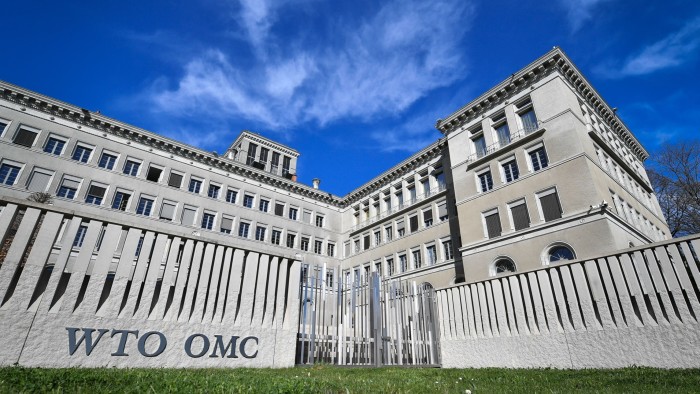Unlock the White House Watch newsletter for free
Your guide to what Trump’s second term means for Washington, business and the world
The writer is a senior fellow at the Centre for International Governance Innovation, a former executive director at the IMF and former WTO staff member
The strength of institutions rests on their capacity to deliver fair and just outcomes. But when people feel excluded or left behind, their legitimacy erodes. Multilateral bodies such as the World Trade Organization are no exception.
When the WTO was established in 1995, there was a broad confidence in the fairness and robustness of the rules-based trading system it oversaw. The US had been its chief architect and the ultimate guarantor of that system. However, over time Washington developed legitimate concerns about how the multilateral trading system evolved. American public opinion also shifted.
Which brings us to Donald Trump. Let’s be clear: the WTO has many dysfunctional working practices, all of which precede Trump’s first term in office. So it would be unfair to suggest that the US president is bulldozing a previously well-oiled institution.
The WTO currently has 166 member nations. Roughly two-thirds of them claim “developing country” status: this entitles them to “special and differential” treatment, which allows them to make slower and less ambitious tariff reductions. But here’s the catch: WTO rules allow any country to self-declare as “developing” and remain in that category indefinitely — China included. Unsurprisingly, this undermines negotiations, as talks quickly become bogged down in demands for carve-outs or flexibilities for the self-declared developing countries.
The paralysis goes beyond new negotiations. The WTO’s dispute settlement mechanism is also not working, with the US refusing to approve new appointments to the appellate body (where I once worked).
WTO rules were crafted under the assumption that trade would be driven primarily by private actors seeking to maximise profits. That assumption no longer holds. China was the first major economy since the creation of the WTO to use trade as a tool for achieving political goals. Increasingly, many western countries — not least the US — are doing the same.
Of course, Trump should be criticised for undermining what remains of the rules-based system that the US once championed. But his hostility towards the WTO reflects a broader, collective failure.
Many of us believed deeply in the benefits of trade liberalisation and the economic interdependence it fostered. We assumed that the gains from globalisation would outweigh the costs. Job losses were anticipated, but we believed they would be offset by the creation of better paid, more productive jobs. But that turned out to be a serious political miscalculation. We are now living with the consequences.
We assumed — often more on faith than on evidence — that displaced workers could transition smoothly into more competitive sectors, aided by unemployment benefits, retraining programmes and portable pensions. Those assumptions may have been theoretically sound, but they dissolved on contact with the real lives of millions of workers and communities.
We now understand that labour is much more than just a factor of production. Jobs shape our identities and our roles in society. For many, trade liberalisation has meant precarity. Moving from a stable job to unemployment felt to them like betrayal by political and economic elites. Trump recognised this. So rather than stigmatising voters who support populists like the American president, we must start with a mea culpa.
A good start would be to acknowledge that the failure to manage the transition from declining industries compassionately and effectively helped create the very conditions in which populism thrives.
So before blaming Trump, let’s first look in the mirror.
#blame #global #trade #chaos #Trump


